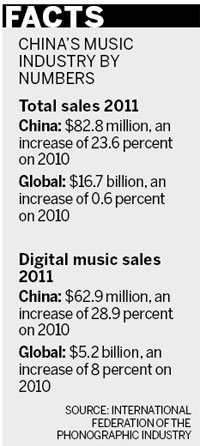|
 |
|
Music fans browse through CDs and records at the Indie Music record store in Jiugulou Dajie, Beijing. [Photo/China Daily] |
Music producers also complain that they are losing out in the ring tone business. China Mobile made more than 26 billion yuan in 2010 from ring tone sales, a figure that exceeded 30 billion yuan last year, according to the China Audio-Video Association.
"They make so much money on music, but (mobile phone service companies) pay very little to us," Zhan said.
To try to make ends meet, many producers are finding other outlets.
Taihe Rye Music, once the largest record label on the Chinese mainland, did not renew the contracts of any of its artists two years ago, including stars such as Chris Li and Pu Shu. Now about 70 percent of its revenue comes from royalties from more than 2,000 songs the company owns.
With limited income from their records, many bands are turning to touring.

Tian Jianhua, spokesman for the punk band Reflector, said the band puts on more than 200 performances a year, but its best-selling record has sold only about 100,000 copies.
"If we relied purely on album sales, we would already have starved to death," Tian said.
Record label Modern Sky has in recent years gone the way of music festivals. Each year, the company hosts the Strawberry Music Festival, China's largest, in Beijing, Shanghai and Xi'an.
Similarly, 13-Month, a company famous for finding folk bands, has held an annual national tour called Folk on the Road since 2009. It is also producing short films. Only 10 percent of its more than 10-million-yuan revenue last year came from royalties.
Domestic record companies are not the only ones to suffer from the demise of the industry in China. Universal Music, the world's biggest music company, is finding it tough to survive in the nation.
Although the company will release more digital albums this year, it will slash the number of CDs and records from last year's 200 to 160.
"It's mainly because of piracy," said Janis Chang, general manager of Universal Music Group International China. "We cannot even recover the production costs."
US pop singer Taylor Swift, who is signed to Universal Music, has so far sold 7 million albums worldwide, but only 100,000 in China.
Starsing Records is the agent of three multinational music companies in China. When the company wanted to publish British singer Adele's album 21, it found more than 100 pirated records on the market.
For Chang, challenges for the Chinese music industry include informing people of the harm that pirated online music can do to the industry, and strengthening legal safeguards.
But when asked why they are still making music, many in the record business cite their perseverance, their love of music and their hope that the business will evolve someday.
"The current chaotic market needs regulation," said Chang, adding that "recent industry booms like ring tones promise huge market potential. Once the environment gets better, you can imagine how many opportunities we will have".
Shen Lihui, general manager of Modern Sky, is also optimistic. "I think in three to five years, China's copyright law will be perfected and everything will get better."
Guo Biao, the IFPI's chief representative in China, agreed.
"Once the business environment gets better, the market will boom very quickly," he said.
The reason for their optimism partly stems from recent efforts by the Chinese government to protect intellectual property rights.
Since 2005, it has been cracking down on online music piracy. Last year, the State Council established the National Leading Group for IPR Enforcement, headed by Vice-Premier Wang Qishan. In a three-month campaign last year, 17 major illegal websites that offered unauthorized services, such as free downloads of books, movies and research papers, were closed.
Another reason for optimism is a draft amendment to the copyright law. The draft demands that commercial activities using music for commercial purposes must pay music companies or musicians a fair price. If the law is passed, restaurants, cafes, and television and radio stations will need to pay musicians if these venues use their music.
Last year, performance rights - fees that record labels charge users for commercial usage of their music - accounted for 6 percent of their global revenue, and this figure is set to rise, according to the IFPI.
IFPI CEO Francis Moore said at the China International Copyright Expo on June 22 that "here in China, there has also been important progress for the music and creative industries.
"China continues to present an extraordinary, and to a large extent untapped, opportunity for the music industry and artists."
At the launch ceremony of Evergrande Music, Gao Xiaosong, a Chinese musician who joined the company with Song Ke, said: "We want to build a big music company that will last 100 years."
"Recently we saw the government move to develop the music industry. We feel that the music industry's spring is coming soon. Many big investors want to test the waters. We are leading the trend," Gao told Beijing Daily.
Sun Yuanqing contributed to this story.
yangyang@chinadaily.com.cn
